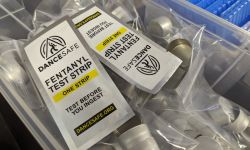Michigan’s ‘Dr. Bobby’ steps into hot seat to lead American Medical Association
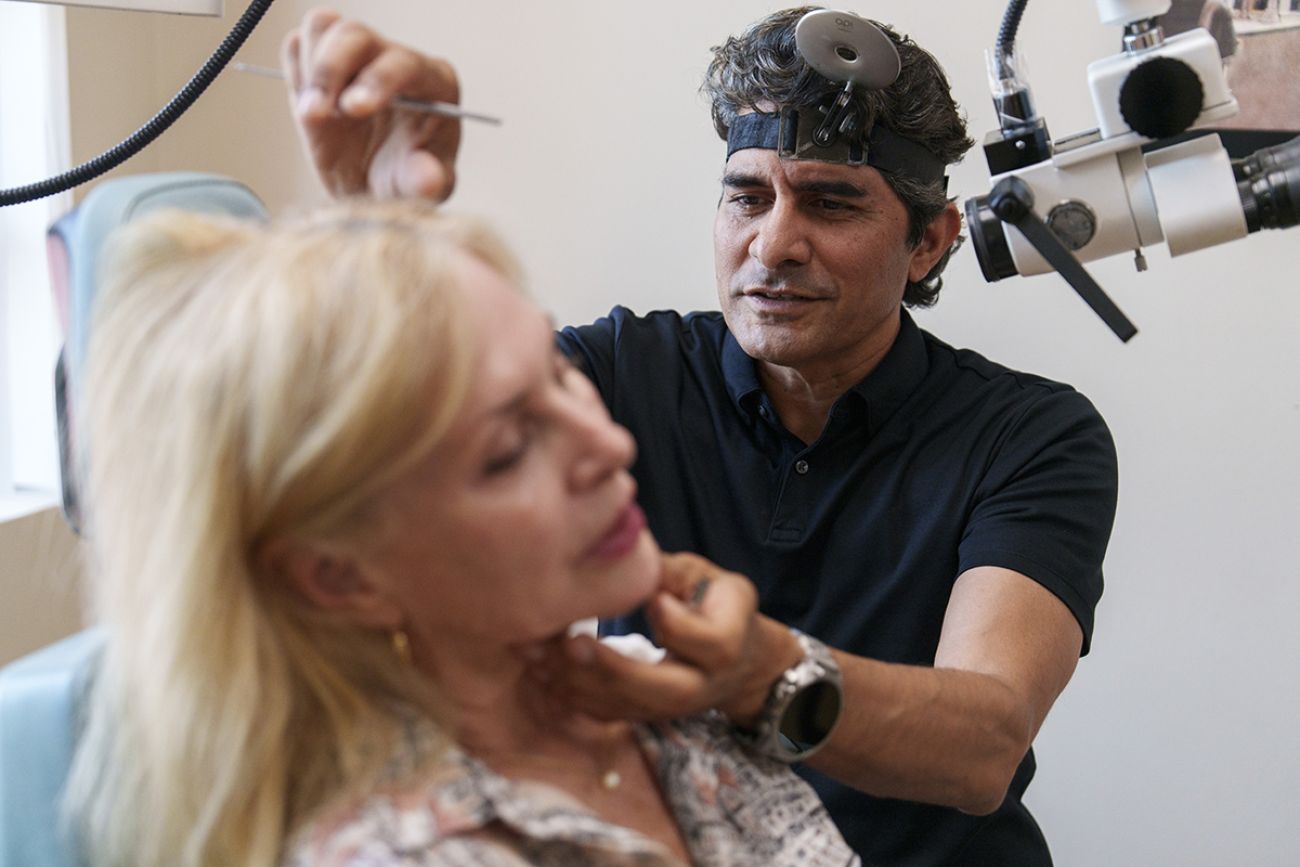
- Dr. Bobby Mukkamala, an ear, nose and throat specialist, has taken on leadership roles in the state’s and nation’s medical organizations
- Friends say his soft-spoken, approachable manner makes him uniquely positioned for the hot-seat role
- ‘Dr. Bobby,’ as he’s known, says he will draw on his experience as a brain cancer patient to better the nation’s health care
FLINT — The new leader of the nation’s largest and most respected doctors organization was tugging at ear wax this week.
“The good news,” Dr. Bobby Mukkamala deadpanned, “is that you’ll leave here a quarter pound lighter.”
The 54-year-old doctor deposited a final smear of wax onto a disposable wipe, reinserted the patient’s hearing aid, and slid his chair back with a smile.
“Does that help?”
The patient touched his ears, marvelling at how much better he could hear. “Wow, that’s great!”
This is Flint’s home-grown “Dr. Bobby.”
Classic car enthusiast, longtime leader of the Michigan State Medical Society and a recent patient himself after being diagnosed with a brain tumor, Mukkamala last week was inaugurated to the highest role yet.
As president of the American Medical Association, Mukkamala, who also is a head-and-neck surgeon, will be the global voice for the nation’s primary care doctors, specialists and medical students. The association represents more than 190 state and specialty medical societies, according to its website.
His goal: To close gaps in the health care system, he said, that leave too many people waiting for life-saving care.
That won’t be easy.
Related:
- COVID vaccine not needed for kids, pregnant women, US says. What to know
- Should refusing vaccines be a civil right in Michigan? Some lawmakers say yes
- Michigan Medicaid has ballooned. Cuts are likely. Here’s what to know
Mukkamala takes the reins at a tumultuous time. Doctors and patients face the prospect of massive cuts in Medicaid. Physicians say Medicare reimbursements have continued to fall behind. Burnout continues, and the nation’s (and Michigan’s) physician shortages continue to grow even as the cost to train new doctors increases. Health research funding is on the chopping block. Drug costs continue to rise and doctors continue to battle insurers over billing practices.
And his new role is fraught with politics, even as the group has tried to sidestep it, its board chair has acknowledged.
Critics in the GOP accuse the AMA of tilting too far left, especially on culture war issues such as transgender care. Mukkamala has given more than $47,000 in political donations over the years, more than $44,000 of that to Democrats and Democratic causes.
This week, Mukkamala criticized the US Supreme Court decision a day earlier that upheld a Tennessee law banning minors from receiving gender-affirming care, Mukkamala continued earlier arguments by the AMA, saying, in part, that the “AMA opposes efforts by the government to insert itself into the patient-physician relationship.”
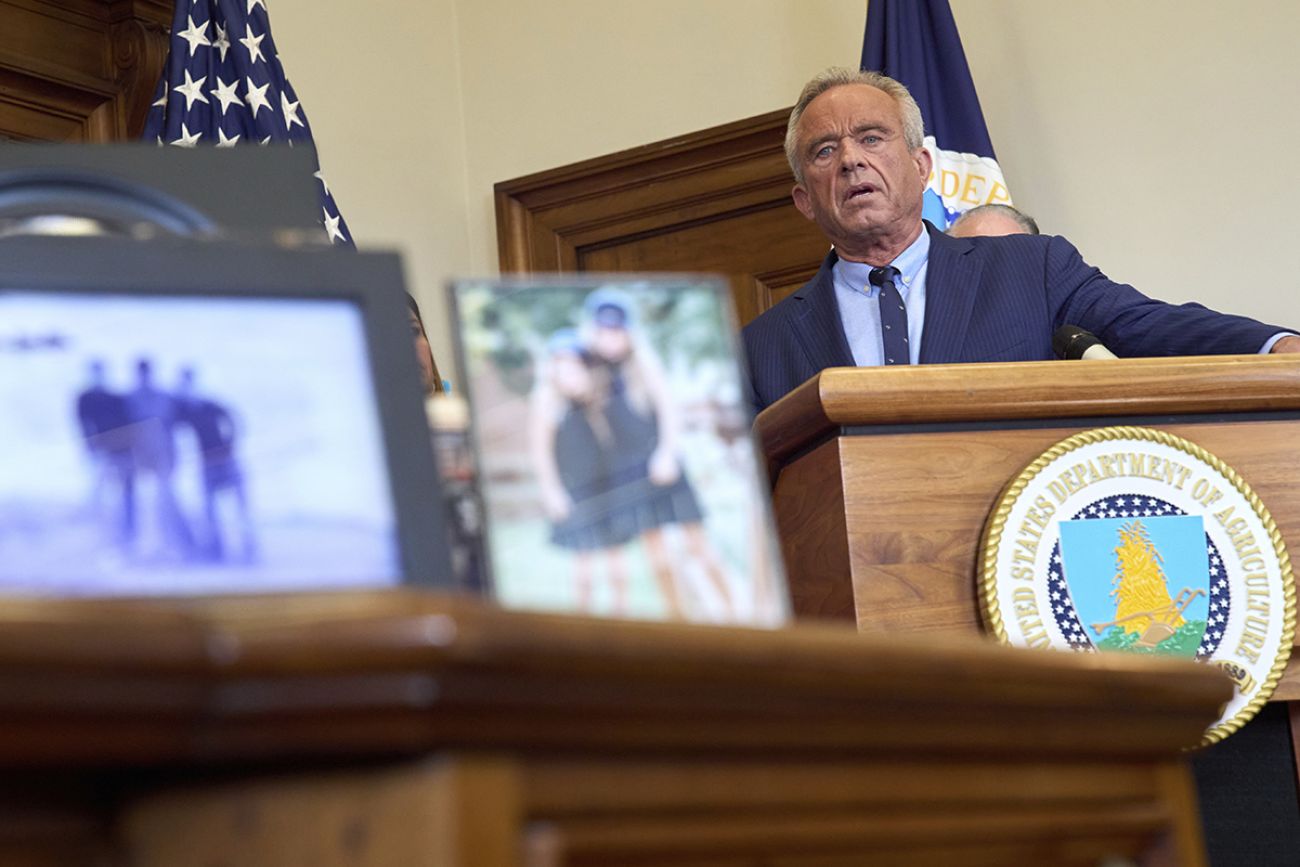
Meanwhile, Health and Human Services Secretary Robert F. Kennedy Jr. has begun to overhaul the nation’s public health structure. Mukkamala accepted the new role the day after Kennedy summarily dismissed the nation’s vaccine advisers — a move that medical organizations immediately criticized. Kennedy later named a new set of advisers.
Those who know Mukkamala say his soft-spoken, thoughtful, Midwest-approachable nature makes him most qualified for the role, which his colleagues say will require both focused listening and masterful diplomacy.
After all, he'll not only be the voice for the American Medical Association, but must finesse the factions within it, said Dr. Mark Komorowski, a plastic surgeon who said he has known Mukkamala for about 30 years.
In the days after the change in the vaccine advisory board, Mukkamala released a statement saying the AMA is “deeply concerned” about the move. He urged the Trump administration to “recommit to maintaining vaccine access for all Americans.”
Not every doctor was immediately ready to criticize the move. Komorowski said RFK “is not against vaccines; he wants to make sure they’re safe” and discourse in science is critical.
Mukkamala’s “disarming” approach will enable him to navigate nuances and maintain his peers’ respect, Komorowski said.
“He has this knack for understanding perspectives and offering insight,” he said.
“With Bobby, you know you will be seen and heard, no matter your issue and no matter your station in life,” said Dr. Lou Edje, senior associate dean for medical education at the University of Michigan. Edje delivered a nominating speech for Mukkamala’s new role.
“He’s the right person for the right time,” she said.
No stranger to controversy
Soft-spoken, perhaps, but the man whose life work is about helping people hear better has been… well, heard.
He’s waded into thorny issues before: encouraging the use of masks in the early days of the coronavirus pandemic, acknowledging a tipping point against such mandates, questioning the use of ivermectin for dying COVID patients (controversial and unproven) and criticizing the insurance industry’s practice of surprise billing.
In the early days of COVID, Mukkamala and his son, Nikhil, used 3D printers and leftover surgical plastic to make protective masks for nursing homes and outpatient clinics. Mukkamala was quick to offer credit to his hometown, Flint, which he called “a community of makers.”
Months later, when the first COVID shots were being distributed with long waiting lists and lines, he was among the first to press primary care doctors into service, enabling Michiganders to be vaccinated in the convenience of a regular doctor’s visit.
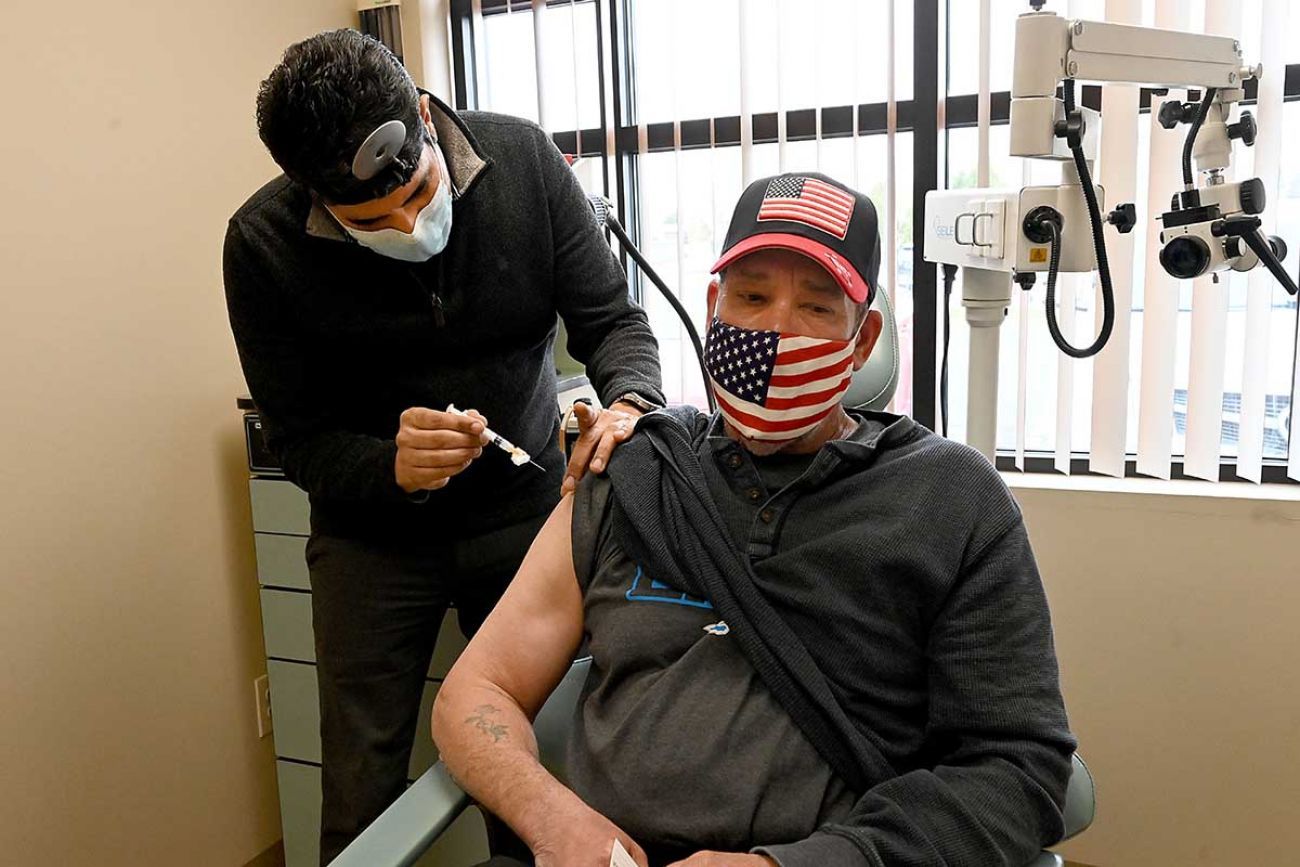
Mukkamala was sitting in his office Tuesday outside downtown, a few minutes break between patients in the private practice office he shares with his med school crush and now wife, Dr. Nita Kulkarni, an OB-GYN.
Agreement — at least understanding — starts with first establishing common ground, he said.
Consider Kennedy, the HHS secretary and vaccine skeptic. Last month, he announced that the COVID vaccines would no longer be recommended for pregnant women and healthy children, although the recommendation was later walked back a fraction.)
A focus on preventing disease, rather than just treating it — that’s where he and Kennedy agree, said Mukkamala, whose salary is $298,865 to represent a membership of more than 290,000 physicians and physicians-in-training.
“Every billboard you ever see on the expressway is about disease, heart attacks, strokes. ‘You want to get your hernia fixed? Call our hospital.’ ‘Do you want your hip replaced? Do you need your knees looked at? Do you have chest pain? Come here.’
“That's good, but it's ridiculous that there isn't one billboard that says, ‘Do you want to prevent your heart attack? Come and see us, and we'll help you prevent your heart attack by teaching you how to exercise.’
“These are the things that I would like to see us focus on, because I think we'll be a better country,” said Mukkamala, who incorporates a short nap into each weekday lunch break. On this day, he had a 6-mile run scheduled in the evening.
Of Kennedy, he said, “I’m looking forward to any conversation I can have with him.”
While the AMA’s dues-paying members are doctors and doctors-in-training, its mission is the nation’s health, he said.
Mukkamala will draw from his experience one night last November when — just a day before he was to help fellow classic car enthusiast Jay Leno host a fundraiser in Flint — he stared at scans of his own brain. As cross-section images flashed on an MRI machine, they exposed the white mass deep within the left side of his brain.
It was an 8-centimeter tumor.
Doctor as patient
Days earlier, Mukkamala had been speaking in Orlando to AMA colleagues about minority affairs in medicine. Someone stood up in the audience.
“Bobby,” Mukkamala recalls him saying, “we can’t understand you.”
On some level, he said, the then-53 year old doctor knew his words had become garbled.
Mukkamala thought maybe he’d overdone it. Maybe he was tired. Maybe it was his age. And maybe, too, it was like reading a book and getting stuck in a particularly thick paragraph. Those “brain farts,” he said — they happen.
He finished the presentation, but his phone had begun pinging with texts. Colleagues. His wife. AMA leaders.
Stay right there, they read. We’re coming.
You need to go to urgent care. Now.
Mukkamala was back in Flint two days later. It was a late November night, and most of the MRI staff was gone. A tech noted his deviated septum. But then there was a white splotch — tiny at first but that grew with each cross-section scan until it filled out a massive section of the left hemisphere of his brain.
He called his father, a retired radiologist who was in India at the time.
“I had a video call with him, and I sent him the pictures. He was like ‘Oh yeah, this patient's got a brain tumor.’”
“Then he looked at the name to see if he knew this patient. It was my name.”
“He said ‘We’ve got a problem”
The next hours of “freaking out” by his loved ones perhaps forced in Mukkamala a clinical calm. Rather than a more emotional Capt. Kirk, he said, in a reference to “Star Trek,” he mapped out the plan ahead.
“I’m more like Leonard Nimoy — just the facts,” he said.
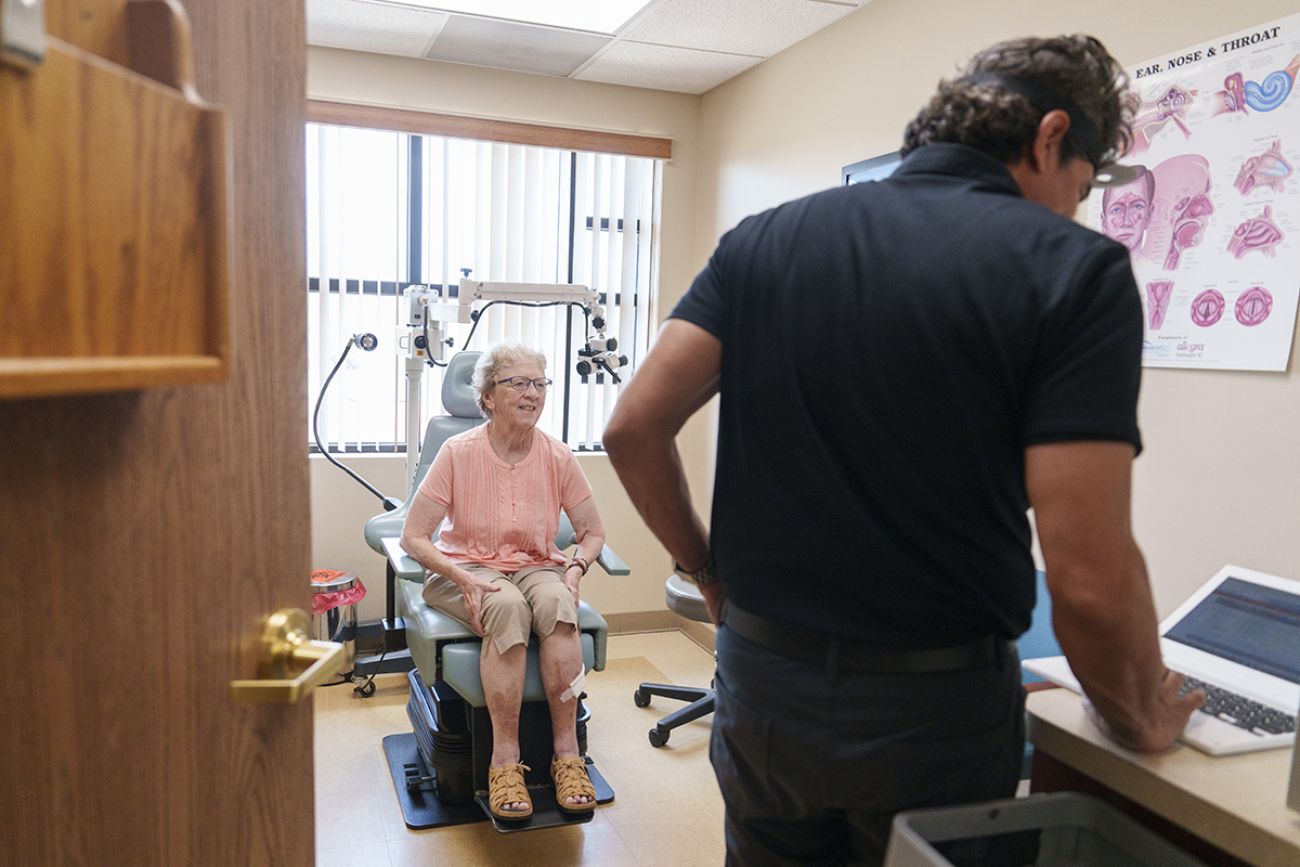
The news spread quickly throughout the Flint community, said longtime patient Christine Gardner. Mukkamala, she said, is a consummate cheerleader for the city, a fixture at its art gallery and fundraisers and community events.
During the Flint water crisis, Mukkamala chaired the Community Foundation of Greater Flint, which helped distribute funds to boost the public health response and help Flint families affected by the crisis.
“Everyone had heard about Dr. Bobby. We were all worried,” said Gardner, a retired special education teacher. “There were lots of prayers going out for him.”
The diagnosis came just before his fundraiser with Leno.
“So this happens to be the day that everybody's finding out slowly that Bobby's got a brain tumor,” he said.
The day was a surreal mix of shock and funny moments. “They're shocked — and, 60 seconds later, I'm shaking Jay Leno's hand and showing him my cars,” he said.
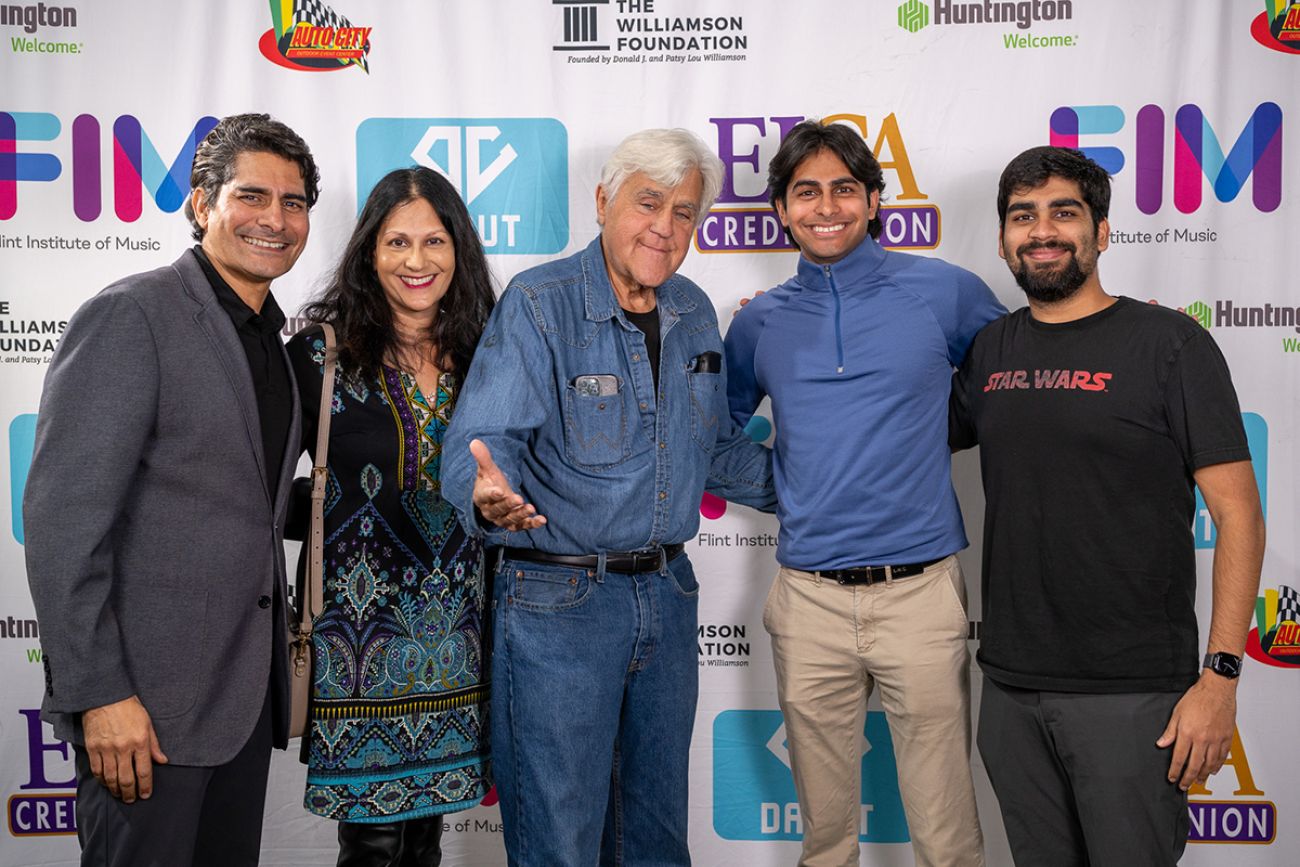
Surgeons eventually removed most of Mukkamala’s tumor, and doctors will continue to monitor the remaining cells.
From boardroom to Bollywood
He talks about his diagnosis as easily as he jokes about his brief stint last year in a Bollywood movie. At an AMA meeting in India, Mukkamala said, he was approached by someone with a camera and connection to a movie being made about 1800s India.
“He starts recording. It turns out he's a movie producer … and sent that video to his director. He came back like 15 minutes later and said, ‘If you're interested, we have a role for you in a movie we're shooting,’” Mukkamala said.
“I thought I was gonna play an Indian guy,” Mukkamala said of the movie that’s still in production.
He laughed: “I played a British tax collector.”
He’ll have to miss any sequel, he told producers: “Just kill me off.”
That’s because he’ll be too busy with AMA duties, particularly in working to close holes in the nation’s health care systems.
His treatment in November — immediate diagnosis and treatment by the nation’s top doctors — underscores the gaps in the system, he said.
In cities like Flint and so much of America, he said, other patients must fight insurance and wait for life-saving care.
“That means patients waiting with tonsil cancer for a month to get the scan they need (for) surgery, and that cancer spreads to a lymph node” in that time, Mukkamala said.
The son of Indian physicians and immigrants, Mukkumala watched as his parents put in long work weeks for their Flint patients, sometimes for patients with little to no insurance. He remembers the stacks of medical charts his mother brought home to wrap up her work late in the evening.
But bureaucracy and inequities in health care now would make their work nearly unrecognizable to them, Mukkamala said.
It’s why he now steps into the national role.
“Being a physician here, we see things that need to be improved, that we can't do in our office,” said Mukkamala. “It's not anything to do with curing a patient of disease. It has to do with curing a country of a health care failure.
“The main purpose of all that was to leave medicine better than I found it.”
See what new members are saying about why they donated to Bridge Michigan:
- “In order for this information to be accurate and unbiased it must be underwritten by its readers, not by special interests.” - Larry S.
- “Not many other media sources report on the topics Bridge does.” - Susan B.
- “Your journalism is outstanding and rare these days.” - Mark S.
If you want to ensure the future of nonpartisan, nonprofit Michigan journalism, please become a member today. You, too, will be asked why you donated and maybe we'll feature your quote next time!



